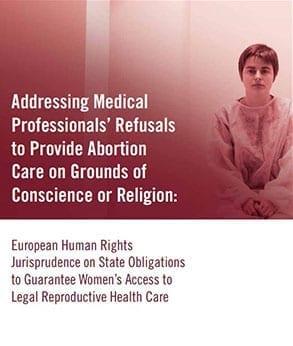EU Set to Vote on Major Policy Initiative
UPDATE: In an unexpected turn
of events, a coalition of conservative members of the European Parliament
forced a vote to send the report on sexual and reproductive health and rights
back to the Women’s Rights Committee for further discussions. The controversial
move delays what could have been a milestone for policy advancement of sexual
and reproductive rights in the European Union. Despite this setback, the issue
will remain on the Parliament’s agenda in the coming months, and the Center
will work with other progressive groups to push to make sure that the members
ultimately vote on the report.
10.21.13 – On Tuesday, October 22, the European Parliament is scheduled
to vote on a report on sexual and reproductive health and rights (SRHR) that if
adopted, will serve as a key policy guideline for all European Union member
states and institutions.
It is a major policy initiative put forward by pro-choice
members of the European Parliament’s Women’s Rights Committee,
calling for among other things, comprehensive sexuality education for all young people, sexual and reproductive
health and rights funding in EU development cooperation, respect for sexual
diversity, and access to modern contraception and legal, safe, and accessible
abortion for all women.
Many
may be surprised to learn that there is a need for the promotion of SRHR within
Europe. But in a number of Eastern European countries such as Poland and
Slovakia, the use of contraception is worrying low. And women in countries like
Poland and Ireland where abortion is almost completely banned are often forced
to resort to illegal abortion or so-called “abortion tourism”-–or carry to term
if they lack the necessary resources to do so.
In
addition, opposition to SRHR is on the rise within and beyond the EU with
reactionary groups opposing the concept of sexual diversity and seeking to
restrict women’s sexual and reproductive autonomy and rights. According
to the UK organization the National Secular Society the report comes at the
best time:
Its call for
convincing and positive action to promote SRHR comes within the context of
virulent anti-choice opposition in several EU countries (e.g. Spain and
Hungary) as well as within European institutions (e.g. the Parliamentary
Assembly of the Council of Europe, the European Committee of Social Rights and
in the Parliament itself).
During the
committee stage, the report met with opposition from a group of conservative
MEPS. They tabled a vast number of amendments, most of which sought to restrict
the reproductive and health rights of women. Many related to the protection of
the human embryo (relying on the controversial ECJ
Brüstle decision) and the extension to the scope of conscientious
objection. These amendments were rejected however, with the report instead
noting the role of conscientious objection in denying many women access to
reproductive health services, such as information about, access to, and the
purchase of contraception, prenatal testing, and lawful interruption of
pregnancy. The report highlights the need to regulate and monitor the use of
conscientious objection, so as to help guarantee that reproductive health care
is provided as an individual’s right.
It
recommends that high-quality abortion services, as a human right and public
health concern, should be made legal, safe, and accessible to all within the
public health systems of EU States.
The report
also stresses the importance of providing comprehensive and non-discriminatory
SRHR information, education and services, through a rights-based approach, that
promotes a positive view of LGBTI persons, and helps in the fight against
stereotypes and all forms of gender violence.
Despite the
Women’s Rights Committee rejecting the conservatives’ amendments, we understand
from MEPs that religious groups have been vigorously mobilising and lobbying
MEPs to vote down the report.
The Center has provided input to the drafters of the report
from the very beginning, ensuring that a rights perspective permeates the whole
text and that its recommendations are based on recognized international human
rights standards. We are also, together with a network of SRHR organizations in
Europe, actively promoting it and striving to counter the dangerous and
systematic attacks on it from reactionary forces within and outside of the European
Parliament.


